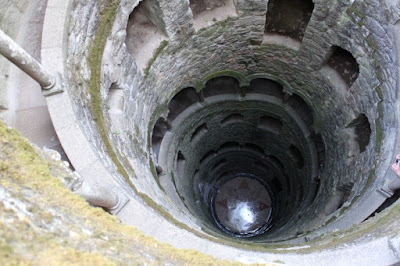Even though most people also speak English here, knowing the native language certainly makes it a lot more fluid and easy to get around, and I use it whenever I have a chance. Being able to read signs that are only in Portuguese also saves us from standing in a lot of unnecessary lines or looking for someone to ask questions of. This made our trek from the airport relatively straightforward, until we arrived in Sintra itself. Thankfully a little free wifi and a little google maps helped us figure out how to navigate the windy, up and down hill roads of the town, and find our hostel.
Even though we hadn't slept in 28 hours, we couldn't wait to get out and explore. Our mission for the day was Quinta da Regaleira, an elaborate estate that is classified as a Unesco World Heritage site. The land was sold in 1892 to a very wealthy man who set about crafting his mansion and sprawling grounds into a place of mystery and enchantment, full of ponds, trails, fountains, wells, benches, gardens, and even an underground tunnel. The entire place is full of symbols related to Masonry, alchemy, the Knights Templar, and the Rosicrucians.
 |
| Entrance to one of the underground tunnels |
We wandered around in an unorganized way, just following whatever caught our interest. Climbed up small towers to see the spectacular views of the town, found entrances to underground tunnels where you needed a flashlight to light your way, drank from spring water coming out of an elaborate fountain, and even walked through an underground labyrinth, with eerie openings that let you view the ponds around you but did not make it clear how to get out into the light of day (we did eventually find the way out).
 |
| Inside the labyrinth... how to escape? |
The highlight was the Initiation Well. After finding the right passage through the series of underground tunnels, we found ourselves at the bottom of a well. This mysterious underground well was used for secret masonic initiation rites. There are actually two of these fascinating spiraling wells, though one is considered "unfinished".
The spiraling architecture of the wells is said to symbolically represent the death/birth allegory. The nine platforms of one of the wells is rich in meaning also - they are said to be reminiscent of the nine circles of Hell, nine sections of Purgatory and nine skies of Paradise from the narrative poem Divine Comedy by Dante. The other well has staircases and landings spaced according to Masonic principles.
 |
| Initiation Well |
As we walked up the spiral staircase, slowly taking in the beautiful architecture, I pondered what it must have been like to be part of such a place full of mysteries and symbolism. What did "initiates" think as they were being led through the dark tunnels? And what did they feel as they found themselves standing in the bottom of a well, about to perform mysterious unknown initiation rites?
As we emerged into the light of day at the top of the well, the symbols continued all around us. Stone satues of different gods and goddesses lined the pathways in the garden; carvings of children with birds and dogs decorated archways; changing geometric patterns graced the sides of different pillars.
We didn't see everything, but you never can with these things. Instead of trying to be systematic, we just wandered, letting ourselves fall into the labyrinths and mysteries of this place in an organic way.
On our way back to the hostel, we stopped for dinner at Tulhas restaurant and had some traditional Portuguese meals of steak marinated in wine and garlic for J, and "Sintra-style" chicken for me. We sat on a tiny table at the outside of the restaurant, watching people and the occasional car go by on the tiny narrow road. The history of this restaurant is fascinating - as early as the 12th-13th century, there used to be granaries here. A circular hole in the ground near the entrance to the restaurant still remains from that long ago time period, the last visible remnant of the structures that used to store grains here so many years ago. A fascinating little place to eat local food and be completely immersed in ancient history.



No comments:
Post a Comment